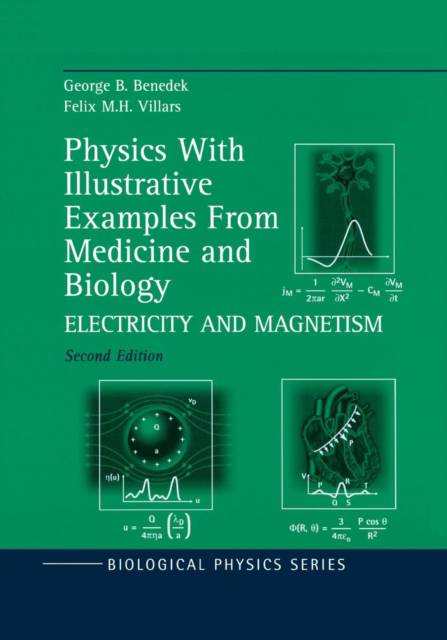
- Retrait gratuit dans votre magasin Club
- 7.000.000 titres dans notre catalogue
- Payer en toute sécurité
- Toujours un magasin près de chez vous
- Retrait gratuit dans votre magasin Club
- 7.000.0000 titres dans notre catalogue
- Payer en toute sécurité
- Toujours un magasin près de chez vous
Physics with Illustrative Examples from Medicine and Biology
Electricity and Magnetism
George B Benedek, Felix M H Villars
125,95 €
+ 251 points
Format
Description
The field of biological physics is a broad, multidisciplinary, and dynamic one, touching on many areas of research in physics, biology, chemistry and medicine. New findings are published in a large number of publications within these disci- plines, making it difficult for students and scientists working in biological physics to keep up with advances occurring in disciplines other than their own. The Bi- ological Physics Series is intended therefore to be a comprehensive one covering a broad range of topics important to the study of biological physics. Its goal is to provide scientists and engineers with text books, monographs and reference books to address the growing need for information. Books in the Biological Physics Series will emphasize frontier areas of science including molecular, membrane, and mathematical biophysics; photosynthetic en- ergy harvesting and conversion; information processing; physical principles of ge- netics; sensory communications; automata networks, neural networks, and cellu- lar automata. Equally important will be coverage of current and potential applied aspects of biological physics such as biomolecular electronic components and de- vices, biosensors, medicine, imaging, physical principles of renewable energy pro- duction, and environmental control and engineering. We are fortunate to have a distinguished roster of consulting editors on the Editorial Board, reflecting the breadth of biological physics. We believe that the Biological Physics Series can help advance the knowledge in the field by providing a home for publications in the field and that scientists and practitioners from many disciplines will find much to learn from the upcoming volumes.
Spécifications
Parties prenantes
- Auteur(s) :
- Editeur:
Contenu
- Nombre de pages :
- 671
- Langue:
- Anglais
- Collection :
Caractéristiques
- EAN:
- 9781461270577
- Date de parution :
- 27-09-12
- Format:
- Livre broché
- Format numérique:
- Trade paperback (VS)
- Dimensions :
- 178 mm x 254 mm
- Poids :
- 1202 g

Les avis
Nous publions uniquement les avis qui respectent les conditions requises. Consultez nos conditions pour les avis.






